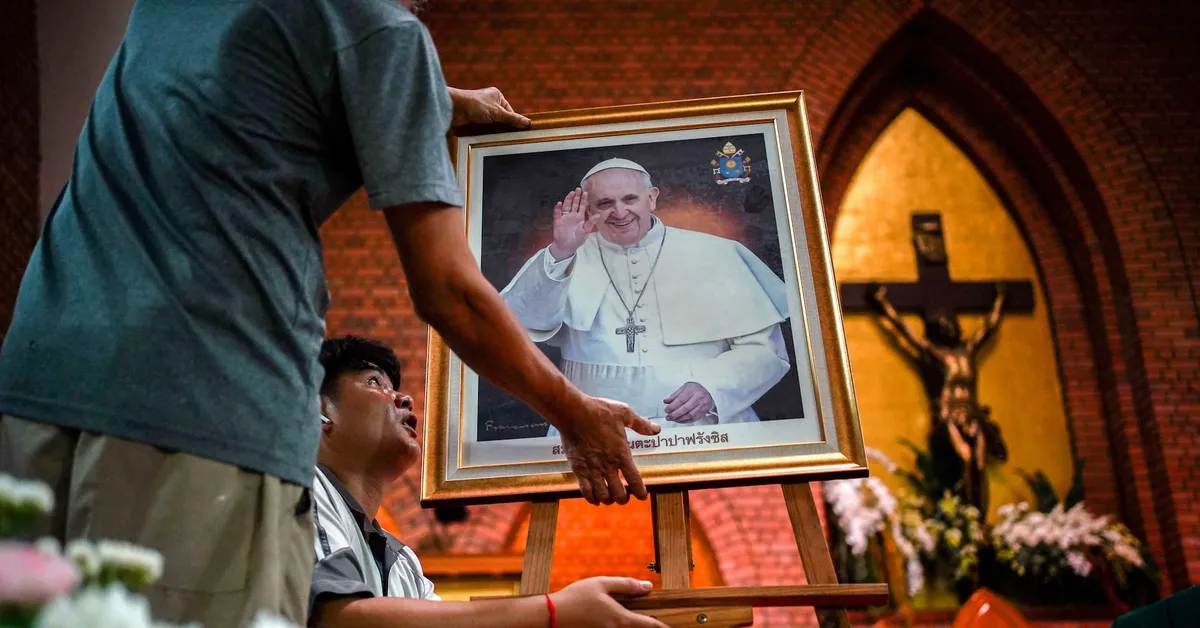
VATICAN CITY, April 22 (Reuters) - In a significant moment for the Catholic Church, cardinals are set to convene on Tuesday to finalize arrangements for the funeral of Pope Francis, who passed away unexpectedly on Monday at the age of 88 following a stroke and cardiac arrest. This funeral will be attended by leaders from around the world, paving the way for a conclave scheduled next month to elect a new head of the Roman Catholic Church.
Pope Francis' death marks the end of a tumultuous papacy characterized by his frequent clashes with traditionalists and his commitment to advocating for the poor and marginalized. Earlier this year, he spent five weeks in the hospital battling double pneumonia, yet he returned to his Vatican residence nearly a month ago and appeared to be on the mend, having made a public appearance in St. Peter's Square on Easter Sunday. His sudden passing has triggered a series of ancient rituals as the 1.4-billion-member Church transitions from one pope to another, including the ceremonial breaking of the pope's Fisherman's Ring and lead seal, rendering them unusable by anyone else.
"We want to thank the Lord for the gifts he has given to the whole Church with the apostolic ministry of Pope Francis, a pilgrim of hope," expressed Cardinal Mauro Gambetti, who led prayers in St. Peter's Square on Monday evening. All cardinals currently in Rome have been summoned to the Vatican at 9 a.m. (0700 GMT), where they are anticipated to discuss the funeral arrangements.
Notably, U.S. President Donald Trump, who had a contentious relationship with the pope regarding immigration issues, announced that he and his wife would be traveling to Rome for the funeral. Other world leaders, including Javier Milei, president of Francis' native Argentina, are also expected to attend. The Vatican has indicated that the funeral ceremony is likely to take place sometime between Friday and Sunday.
In a departure from tradition, Pope Francis confirmed in his final testament released on Monday that he wished to be buried in Rome's Basilica of Saint Mary Major, rather than the more customary St. Peter's Basilica. This decision reflects his personal connection to the basilica and his desire for a more intimate setting for his final resting place.
The gathering of cardinals will also be tasked with reviewing the daily operations of the Church in the interim period before a new pope is elected. A conclave to select the next pope typically occurs 15 to 20 days after the death of a pontiff, which means it is unlikely to commence before May 6. Approximately 135 cardinals are eligible to participate in this highly confidential voting process, which can extend over several days.
Pope Francis inherited a Church fraught with challenges and dedicated much of his papacy to reforming the Vatican's central administration, combating corruption, and addressing the pervasive issue of child abuse within the priesthood. His progressive approach often put him at odds with conservatives who yearned for a return to traditional values, viewing him as overly liberal and accommodating to minority communities, including the LGBTQ population.
Notably, Pope Francis appointed nearly 80% of the cardinal electors who will participate in the upcoming conclave, which increases the likelihood—though does not guarantee—that his successor will uphold his progressive policies. Many of these cardinals are relatively unknown outside their home countries, and they will have the opportunity to become acquainted with one another during the General Congregations that precede the conclave. During these meetings, the qualities and attributes desired in the next pope will begin to take shape.
Following the announcement of his death, the Vatican stated that staff and officials within the Holy See could begin to pay their respects to Pope Francis at the Santa Marta residence, which he chose as his home in 2013, opting for a more modest living situation compared to the grand apostolic palace of his predecessors. His body may be transferred to St. Peter's Basilica as early as Wednesday morning, allowing the faithful to pay their final respects.
This pivotal moment in the history of the Roman Catholic Church marks not only the end of Pope Francis' unique papacy but also the beginning of a new chapter as the Church prepares to select its next leader.